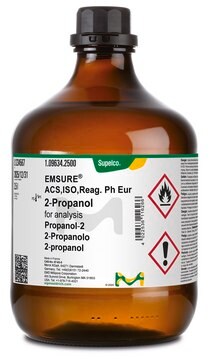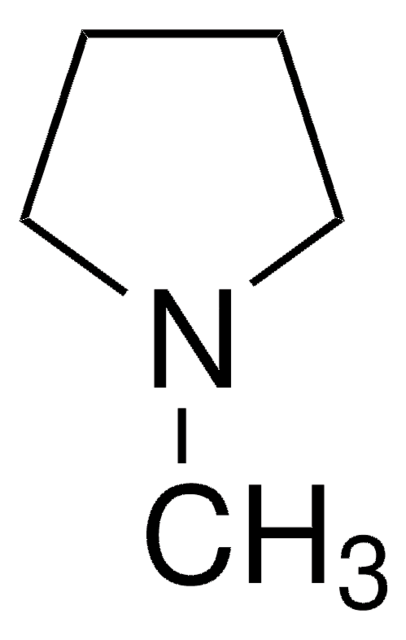8.06072
NMP
EMPLURA®
Synonym(s):
1-Methyl-2-pyrrolidone, NMP, N-Methyl-2-pyrrolidone
About This Item
Recommended Products
Product Name
1-Methyl-2-pyrrolidone, EMPLURA®
vapor pressure
0.32 hPa ( 20 °C)
Quality Level
product line
EMPLURA®
Assay
≥99.5% (GC)
form
liquid
autoignition temp.
245 °C
potency
3598 mg/kg LD50, oral (Rat)
8000 mg/kg LD50, skin (Rabbit)
expl. lim.
1.3-9.5 % (v/v)
dilution
(low-cost alternative, for basic applications)
impurities
≤0.0002 meq/g Acidity
≤0.003 meq/g Alkalinity
≤0.1% Water
color
APHA: ≤10
refractive index
n20/D 1.468-1.473
pH
8.5-10.0 (20 °C, 100 g/L in H2O)
bp
202 °C/1013 hPa
mp
-24 °C
transition temp
flash point 91 °C
solubility
1000 g/L
density
1.03 g/cm3 at 20 °C
storage temp.
2-30°C
SMILES string
N1(CCCC1=O)C
InChI
1S/C5H9NO/c1-6-4-2-3-5(6)7/h2-4H2,1H3
InChI key
SECXISVLQFMRJM-UHFFFAOYSA-N
General description
Application
- Green synthesis of polyimide by using an ethanol solvothermal method for aqueous zinc batteries.: This research introduces a green synthetic approach for polyimide utilizing 1-Methyl-2-pyrrolidone as a solvent, highlighting its efficacy in enhancing the performance of aqueous zinc batteries. The study underscores the critical role of 1-Methyl-2-pyrrolidone in promoting environmentally friendly synthesis methods within the realm of analytical chemistry and battery technology (Zhao Y et al., 2024).
- Facile Preparation of Four-Layer MoS(2) Nanosheets and Their Application to Organic Light-Emitting Diode.: This paper discusses the utilization of 1-Methyl-2-pyrrolidone in the exfoliation process to prepare MoS(2) nanosheets, which are then applied to improve the efficiency of organic light-emitting diodes. The findings reveal the solvent′s pivotal role in enabling the production of high-quality nanosheets for advanced electronic applications (Jiang X et al., 2022).
- Phenylphosphonate surface functionalisation of MgMn(2)O(4) with 3D open-channel nanostructures for composite slurry-coated cathodes of rechargeable magnesium batteries operated at room temperature.: This article presents research on the application of 1-Methyl-2-pyrrolidone in surface modification techniques for magnesium battery electrodes, enhancing their performance and stability. The study demonstrates the solvent′s effectiveness in materials science and its significant impact on battery technology (Kajihara K et al., 2021).
- Novel Semi-Interpenetrated Polymer Networks of Poly(3-Hydroxybutyrate-co-3-Hydroxyvalerate)/Poly (Vinyl Alcohol) with Incorporated Conductive Polypyrrole Nanoparticles.: This research leverages 1-Methyl-2-pyrrolidone in the development of novel polymer networks, integrating conductive nanoparticles to create advanced materials for various technological applications. The study highlights the solvent′s role in polymer chemistry and nanotechnology (Aparicio-Collado JL et al., 2020).
- From 3D to 2D Transition Metal Nitroprussides by Selective Rupture of Axial Bonds.: This publication explores the role of 1-Methyl-2-pyrrolidone in the structural transformation of transition metal nitroprussides, demonstrating its utility in the synthesis and manipulation of inorganic compounds for enhanced material properties and applications in various industries (Ávila Y et al., 2019).
Analysis Note
Identity (IR): conforms
Color: ≤ 10 Hazen
Density (d 20 °C/ 4 °C): 1.031 - 1.033
Refractive index (n 20/D): 1.4680 - 1.4730
Acidity: ≤ 0.0002 meq/g
Alkalinity: ≤ 0.003 meq/g
Water: ≤ 0.10 %
Legal Information
greener alternative product
Signal Word
Danger
Hazard Statements
Precautionary Statements
Hazard Classifications
Eye Irrit. 2 - Repr. 1B - Skin Irrit. 2 - STOT SE 3
Target Organs
Respiratory system
Storage Class Code
6.1C - Combustible acute toxic Cat.3 / toxic compounds or compounds which causing chronic effects
WGK
WGK 1
Flash Point(F)
195.8 °F - Pensky-Martens closed cup
Flash Point(C)
91 °C - Pensky-Martens closed cup
Regulatory Listings
Regulatory Listings are mainly provided for chemical products. Only limited information can be provided here for non-chemical products. No entry means none of the components are listed. It is the user’s obligation to ensure the safe and legal use of the product.
PRTR
Class I Designated Chemical Substances
FSL
Group 4: Flammable liquids
Type 3 petroleums
Hazardous rank III
Water soluble liquid
ISHL Indicated Name
Substances Subject to be Indicated Names
ISHL Notified Names
Substances Subject to be Notified Names
JAN Code
8060729180:
8060722521:
8060721000:
IN2RCMM806072:
8060722501:
8060728888:
IN28060720500:
8060726010:
8060729210:
8060720501:
8060726025:
8060720000:
8060722500:
8060729011:
8060720521:
8060729221:
8060729025:
Certificates of Analysis (COA)
Search for Certificates of Analysis (COA) by entering the products Lot/Batch Number. Lot and Batch Numbers can be found on a product’s label following the words ‘Lot’ or ‘Batch’.
Already Own This Product?
Find documentation for the products that you have recently purchased in the Document Library.
Customers Also Viewed
Our team of scientists has experience in all areas of research including Life Science, Material Science, Chemical Synthesis, Chromatography, Analytical and many others.
Contact Technical Service








